What’s all this talk about biodiversity and ecosystem services? Do they have any practical meaning for day to day living? Or were they invented to serve the agendas of “bleeding heart liberals”, as we are unaffectionately known…At least to some members of the other camp.
Just for a moment, let’s forgo the divisive insults, forget our political and religious differences, and stand on common ground. Basic human needs ought to feel like common ground. Even better, how about basic animal needs? Because human and non-human animals share the same requirements. Food, water, air, and a safe place to live and raise young. That’s what biodiversity and ecosystem services provide for us. ALL of us. We – liberals, conservatives, Jews, Muslims, Christians, everyone – are on common ground with biodiversity!
But just to be clear, here are the definitions of these sometimes confusing and confused terms:
Biodiversity: This is the variety of life. We can speak of it on different levels: genetic diversity within a species, the variety of different habitats within a region, or the species within a particular habitat, country, ecosystem, or food web. Or, we can speak of it in terms of all species present on Earth.
Ecosystem: A group of living organisms (everything from micro-organisms to large carnivores) and natural resources (air, water, rocks, soil, etc.) working together as a system to provide the resources and functions needed for life. These resources and functions are called ecosystem services.
An important point here is that for the system to function optimally, it needs all (or most) of its pieces: its organisms and its natural resources. This is why protecting biodiversity – the organisms within ecosystems – is so important.
This post contains links to online shopping, which is a way for you to support One Acre Farm at no additional cost to you. Click here for my full affiliate disclosure. Thanks for your support!
10 Selfish reasons to protect biodiversity
These 10 reasons are what healthy, functioning ecosystems provide for us. I include only the most vital products and processes in my list. Some people include “supporting services” such as pollination and photosynthesis, but that’s redundant, because those are simply the underlying processes which make possible the products and processes enumerated below. Some people also include “cultural services”, such as recreation, spirituality, and intellectual stimulation. I omit them here, because not everyone values them. Again, I’m looking for common ground – the stuff we ALL need. Here they are:
Products we get from ecosystems
1. Food

Food is an obvious requirement for life. Less obvious, but critical, is the relationship between biodiversity and food production.
Whether you hunt, gather, farm, or shop, your food ultimately comes from nature, and requires functional ecosystems, involving many organisms that we don’t actually eat.
Pollinators come to mind as one example. We don’t eat them, but they perform a key step in the production line of many foods we do eat. Pollinators are declining at an alarming rate, but, fortunately, there are some concrete steps you can take to help pollinators.
Protecting biodiversity is protecting your food supply.
2. Fiber
Cotton, flax, jute, hemp, and ramie are examples of plant fibers we use. Silk is the secretion of silkworms. Sheep’s wool, cashmere, alpaca, mohair, qiviut, and angora all come from animals. Functional ecosystems, whether wild or cultivated, are required to produce all of them.
3. Fuel
Wood and other plant matter comprise about 15% of the world’s energy consumption. This rises to 40% in developing countries. Lose the forests, and you lose the fuel.
4. Medicines
While some people think of modern medicine as “chemical”, and traditional and herbal medicines as “natural”, the fact is that many medications prescribed by physicians come from natural sources.
Even in developed countries, at least half of them come either directly from natural sources, or from natural sources that served as models for the development of new drugs.
Aspirin (salicylic acid) was initially derived from willow trees, and some form of it is present in a variety of plants. Wintergreen, for example, contains methyl salicylate. By the 1860’s salicylic acid was synthesized in the laboratory, and in the 1890’s, it was chemically modified to reduce stomach irritation. Many, many other medicines were derived from, or inspired by, natural compounds. Even today, plants, animals, and micro-organisms remain important sources of, and inspiration for, new medications.
Lost species are lost opportunities. Protecting biodiversity is protecting future medical discovery and innovation!
Processes we get from ecosystems
5. Cleaning and detoxifying air and water
Nature is pretty good at cleaning air and water. Here are a couple of examples:
- Forest canopies clean air by capturing particles produced by combustion of coal, gasoline, and fuel oil. Leaf surfaces are the site of chemical reactions that transform pollutants like nitric oxide into harmless compounds.
- Beavers are remarkable ecosystem engineers. They dam streams to create ponds, in which particles can settle and pollutants can be detoxified. Water is cleaner after passing through a beaver wetland.
6. Moderating climate
Forests, for example, mitigate climate warming by taking up a lot of carbon. Tropical forests alone take up about 15% of the total anthropogenic carbon emissions. Supporting sustainable forestry is something you can do to protect this ecosystem function.
7. Minimizing erosion
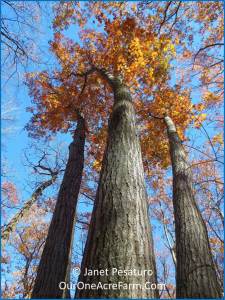
Trees provide food and fuel, as well as several ecosystem functions. They clean the air, moderate climate, and prevent erosion.
Soil erosion damages or destroys millions of acres of the world’s croplands each year. If that’s not enough, erosion also causes deaths through mudslides, where forest has been cleared.
Plants and animals both help reduce erosion. Leaves reduce the force of rainfall on soil, roots bind soil and prevent it from flowing down hill, and animal burrows function like drain pipes.
Again, ecosystems function best with a full suite of species. Protecting biodiversity is protecting yourself.
8. Minimizing floods
Wetlands and flood plains function as sponges that soak up water after storms, protecting us from flood damage. We learned that the hard way: by experiencing the aftermath of draining these areas, to make way for agriculture and development. For example, the loss of flood plain habitat along the Mississippi River has resulted in devastating floods in mid-western states. The situation will only become more serious, as climate change ushers in more severe weather events.
Perhaps we should appreciate, rather than complain about, federal, state, and town laws that protect wetlands. Because wetland laws protect all of us.
9. Controlling pests
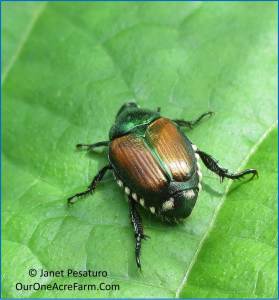 Most vegetable gardeners are familiar with the concept of companion planting to reduce the incidence of pest outbreak. For example, rue (Ruta graveolens) might be effective in repelling Japanese beetles. Permaculture goes beyond companion planting, and involves mimicking natural ecosystems to create entire food-producing habitats which resist pest outbreaks (and other problems, such as soil erosion and depletion).
Most vegetable gardeners are familiar with the concept of companion planting to reduce the incidence of pest outbreak. For example, rue (Ruta graveolens) might be effective in repelling Japanese beetles. Permaculture goes beyond companion planting, and involves mimicking natural ecosystems to create entire food-producing habitats which resist pest outbreaks (and other problems, such as soil erosion and depletion).
The point is that species rich systems (those with high biodiversity) are less susceptible to pest outbreaks than species poor systems, such as monocultures.
10. Controlling human diseases
Much as biodiversity protects against pest outbreaks, as explained above, biodiversity also protects against disease outbreaks. Human disease outbreaks. For example, forest fragmentation does at least two things that can lead to the spread of disease.
- It increases “edge habitat”, where the forest meets an open area, such as a backyard. That increases our exposure to certain disease carrying mosquitoes, flies, ticks, and rodents, which thrive at the forest edges.
- It reduces carbon sequestration, which accelerates climate warming. That permits the range expansion of some disease carrying organisms.
Lyme disease is a familiar example here in the eastern US. White footed mice carry the ticks which carry the Lyme disease causing bacteria. These mice are most abundant at the forest edge. That is, where the forest has been fragmented. And, climate warming is allowing white footed mice to thrive further and further north.
Protecting biodiversity is protecting yourself.
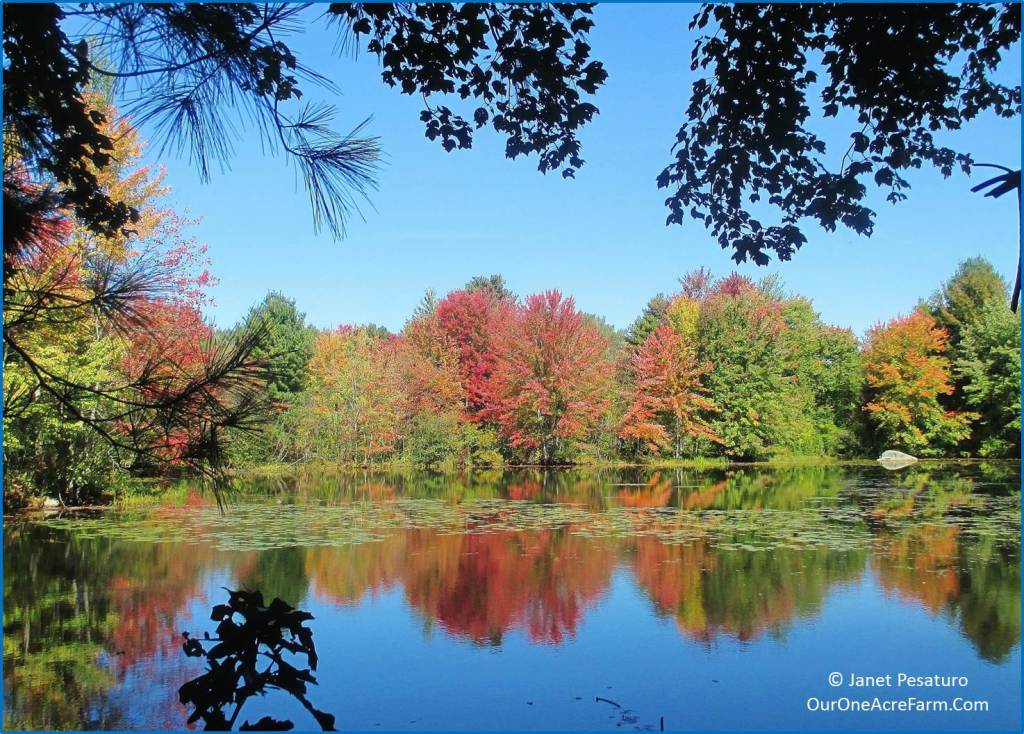
I did not include outdoor recreation or aesthetic inspiration in my list of ecosystem services, because not everyone values them, but surely this setting provides those and more.
Sources:
- Carbon Management in Natural Ecosystems
- Chivian, E. and A. Bernstein, editors. 2008. Sustaining Life: How Human Health Depends on Biodiversity. Oxford University Press.
- Ecosystem Services
- Simon, J. A., et al. 2014. Climate change and habitat fragmentation drive the occurrence of Borrelia Burgdorferi, the agent of Lyme disease, at the northeastern limit of its distribution. Evolutionary Applications, Vol. 7, Issue 7.
- Tansy and Rue…Integrated Pest Management
- What is Biodiversity?
- Wood, C. L. and K. D. Lafferty. 2013, Biodiversity and disease: a synthesis of ecological perspectives on Lyme disease transmission. Trends in Ecology and Evolutuon. 28(4): 239-247.
Shared on: HomeAcre Hop, Simply Natural Saturdays, Homestead Barn Hop, Thank Goodness it’s Monday, Tuesdays with a Twist











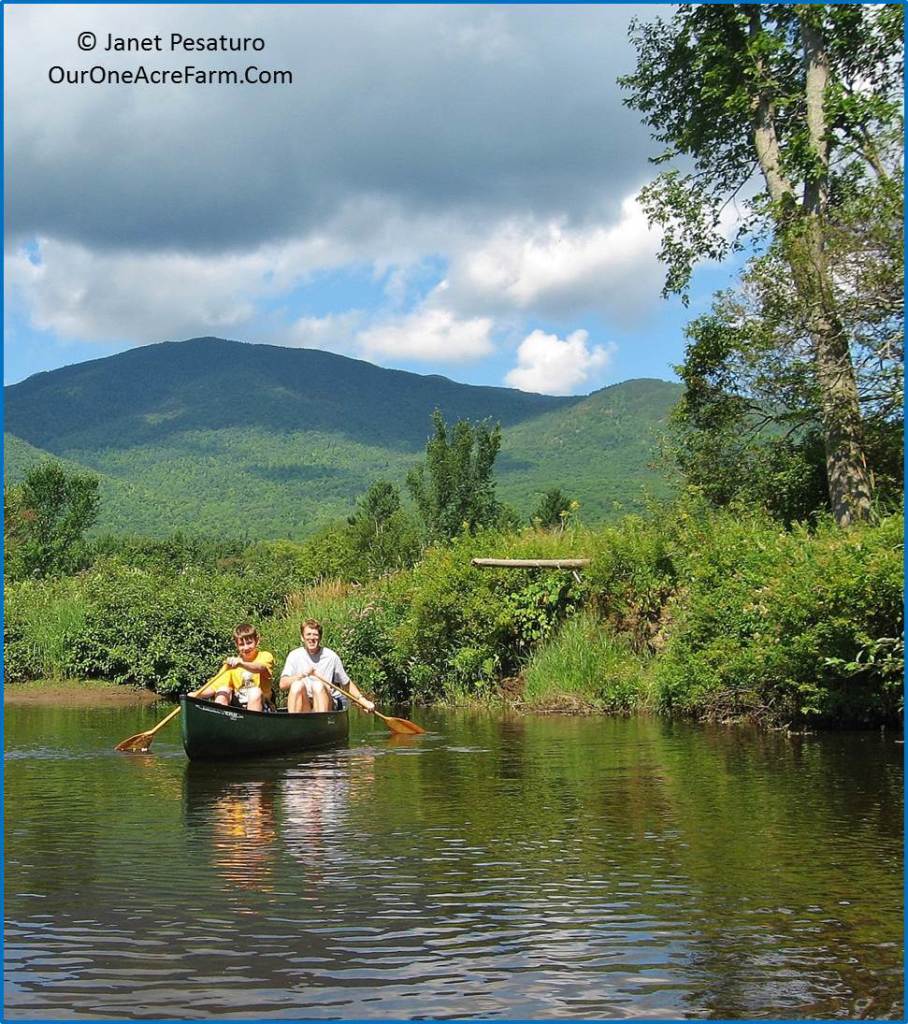
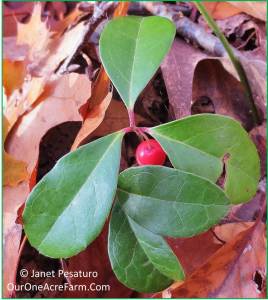
I hear you & last time too. I think it’s very interesting & very real. I don’t know what to do about #10 though. I have that situation slightly at the back of my yard. Should I try to feather in some plantings. Maybe pines or others? Maybe different trees than are before the line? That’s a beautiful lake scene. I appreciate your intelligent & gentle views in an ever changing world.
Hi Julie, the recommended ways to reduce the risk of Lyme disease differ, depending on scale. On small scale, such as your own backyard, it’s probably most effective to focus on removing places for ticks to hide. Mowing the lawn frequently, removing trash, stacking wood neatly in a dry area, etc., are sometimes suggested, but are probably minimally helpful. You can google the topic for more info.
Reducing the risk of Lyme and other contagious diseases on larger scale would be more effective, but we humans would need to cooperate more on landscape planning. Clustering development, and protecting large, unbroken tracts of land should reduce the risk, because it minimizes edge habitat and people’s exposure to it. What is risky is this habit we have of carving up the forest into small fragments.
To further large scale efforts, support land protection organizations by volunteering your time or money. Locally, you could join your town’s conservation commission, land trust, or planning board, and help protect land, and/or support clustered development.
And thanks for the kind words!
Thank-you Janet for the information. That was helpful. I will look into those things you suggested in my community. Again thank-you, especially the personal reply! I really enjoy your website. The articles are important & timely.
What an amazing post! Yes, so many reasons to protect the Earth that are for human benefit!
Thanks for stopping by, Ash!
Wow, Janet! This is such an amazing post!!! Thank you for writing it… 🙂
***starts to share it all over the place***
~ Christine
Thanks, Christine, it means the world to me that some people like this enough to actually comment. I really appreciate the shares, because these “heavy” topics are much less popular than posts about chickens or recipes, especially on social media, but the heavy topics that are my passion and mission. They are the reason I blog. Take care!
Always glad to read a new post from, One Acre Farm. Great subject Janet, keep up the good work with your clear vision towards, doing what is right for our planet.
Thanks, Paul!
I am always appreciative of “Deep Thoughts by Janet” 🙂 This one is no exception. Thanks for reminding us that we are all a part of – and dependent on – the greater ecosystem. Too bad ecological land management isn’t required learning by all, it’s just amazing that it’s not!
Thanks, Amy! I think educators are finally starting to infuse ecology into science curricula, which is an important step forward.
Pingback: Wildlife Garden and Native Plant News
Thank you for sharing at Tuesdays with a Twist. YOU have bee featured this morning at Back to the Basics!!!
I always love reading your articles.
That’s great news, Mary, thanks!
Pingback: My Week on Wednesday and Earth Day » Once Upon a Time in a Bed of Wildflowers
Hi Janet,
Thank you for this post. Often not a topic many people are willing to discuss in a sane purpose driven way. We are all one and must start acting like it in order to save ourselves. It doesn’t matter what color your skin is, nor what religion you are or even your political views. What matters is that we all educate one another and work together. I really appreciate your posts! Carin
I’m glad you enjoyed it, Carin, you just made my day!